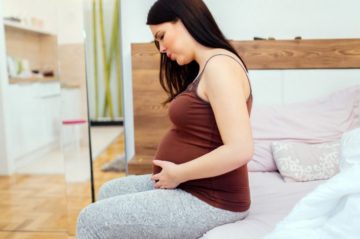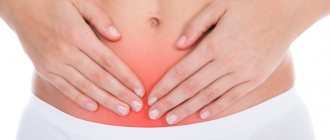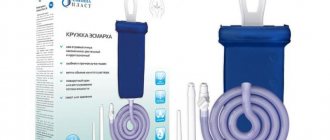Causes of diarrhea
For a certain period of time before the onset of labor, pain may appear that is nagging in nature. While carrying a child, contractions may be felt; they are of a training nature.
The baby gives signals that it is ready to be born soon. Towards the end of pregnancy, appetite worsens. Against this background, there is a possibility of developing diarrhea. Representatives of the fair sex who have given birth are aware of this feature. They do not give in to anxiety or panic. Their emotional state remains at the normal level. Unpleasant symptoms disappear as soon as the mother meets her baby.
From 38 weeks, the appearance predicts the imminent onset of labor. This phenomenon is physiological in nature. The body needs to get rid of everything unnecessary. Diarrhea before childbirth is a normal reaction. Diarrhea does not require special treatment during pregnancy if this does not affect the well-being of the expectant mother or her activities.
By the expected date of birth of the child, all organs and systems of the body begin to adapt to childbearing.
The cause of diarrhea before childbirth is the prolapse of the uterus into the pelvic area. With the positive aspects of this process, there is an increase in the urge to go to the toilet. This is due to additional pressure on the bladder and sacrum. In some cases, the reverse process occurs - constipation. The peculiarity of diarrhea in pregnant women is that it does not lead to dehydration. The water-salt balance is kept within normal limits. The consistency of stool is mushy. The volume of stool is small. If the expectant mother is observed in the inpatient department of the maternity hospital, then it is necessary to inform the doctor about the onset of diarrhea and its frequency.
After 37 weeks, the fetus is actively gaining weight, activity decreases. The closed space restricts his movements. Symptoms of early labor can appear at any time. The woman must be ready to be placed in the delivery room.
Causes of diarrhea in a pregnant woman
Diarrhea occurs for three main reasons: physiological, intestinal infection and disruption of the digestive system.
The cause of physiological diarrhea is the body’s preparation for childbirth. The baby changes its position in the uterus and descends into the pelvic area, ceasing to compress the stomach and lungs. The mother's breathing becomes easier and heartburn disappears. This happens because the uterus stops putting pressure on the diaphragm, which makes breathing easier. Heartburn disappears due to the lack of pressure on the stomach, squeezing the eaten food into the esophagus. But the positive effect of moving quickly gives way to some discomfort: pressure on the sacrum, deformation of the bladder and intestines, and indigestion. The first reason interferes with sleep, the second causes a frequent desire to urinate and dilutes the stool. The disorder is accompanied by loss of appetite and, in rare cases, vomiting.
The second common cause of diarrhea during pregnancy is an intestinal infection. A pregnant body is weakened and unable to cope with bacteria and viruses entering the body. It is necessary to urgently consult a doctor to prescribe treatment if the patient is bothered by the following symptoms:
- heat;
- vomit;
- yellow or green stool with mucus, foam and an unpleasant odor.
This can negatively affect the condition of the expectant mother and the development of the fetus.
The third cause of diarrhea is diseases of the gastrointestinal tract (gastrointestinal tract). Disruption of their work causes dyspepsia (lack of enzymes). Because of it, food is digested and absorbed worse. Undigested food is eliminated from the body in liquid form. Dyspepsia requires serious treatment - the normal functioning of all organ systems depends on the state of the gastrointestinal tract.
Diarrhea as a sign of imminent labor
The main signs of approaching labor are:
- Advancing the baby into the pelvic area. As expectant mothers say, the belly begins to sink. It becomes easier for a woman to breathe. Mommy's palm is placed between the chest and stomach. Pressure on the stomach decreases.
- Increasing pain in the groin area. Additional pressure is placed on the pelvic bones. This can lead to a condition where it becomes difficult for the expectant mother to find a comfortable body position. It becomes more difficult to choose a comfortable sleeping position.
- Mucous discharge, colored brown. The process is indicated by the removal of the plug, which all the time protected the baby from infection.
- Bloody issues. The phenomenon does not indicate danger. The baby's pressure causes small blood vessels to burst.
- Discharge of amniotic fluid. This sign indicates that the moment when mother and baby will see each other for the first time is approaching.
- Diarrhea.
Loose stools before childbirth come as a surprise to some women.
In primigravidas, prenatal diarrhea may occur several weeks before admission to a health care facility. In multiparous women, diarrhea before childbirth may occur during contractions. The described condition increases gas formation, and spasmodic pain is possible.
With an empty intestine, it is easier for the fetus to pass through the birth canal. If the expectant mother has a decreased appetite or lack of it, it is not worth persuading her to eat. The body signals that there is no need for an additional portion of nutrients. An intestine overloaded with food can cause discomfort in the form of belching and heartburn.
Some women in labor experience discomfort and embarrassment if diarrhea overtook them at the time of examination by the obstetrician. Doctors study the characteristics of the body during the period of delivery and are prepared for unforeseen situations. If diarrhea occurs at the start of labor, there is no need to artificially cleanse the intestines.
Situations may arise when diarrhea before childbirth is accompanied by vomiting. An increased amount of hormones provokes a state of nausea. It is recommended to refuse food and water so as not to provoke a gag reflex. If a woman realizes that she is unable to cope with the urge to vomit, the staff will provide her with a container to relieve the condition.
What measures to take for diarrhea before childbirth?
A woman during pregnancy should closely monitor her well-being, and if the slightest alarming changes appear, notify the doctor. After 37 weeks, the baby is considered full-term, and labor can occur at any time, so diarrhea should not be a serious concern. You can determine the approach of labor by other signs. The main ones are:
- nagging pain in the lower abdomen;
- discharge of the mucus plug;
- decrease in the number of fetal movements;
- prolapse of the abdomen.
Some women report sudden mood swings the day before the upcoming birth. This is also due to hormonal fluctuations. If diarrhea develops against the background of these symptoms, then there is no cause for concern. This is a signal to meet your baby as soon as possible.
Nutrition for prevention
Two to three weeks before the expected date of birth, a woman is advised to review her diet. You should not overload your digestive system with heavy meals. The consumption of fast carbohydrates, sweets and cereals should be kept to a minimum. The basis of nutrition during this period consists of products of plant origin.
Consumption of fermented milk foods should be careful. The presence of bacteria in them can lead to increased gas formation and changes in stool consistency. You should limit your intake of carbonated drinks, fatty, fried and salty foods. Unpleasant sensations in the stomach will bring additional discomfort to the expectant mother.
Treatment of diarrhea during pregnancy
It is recommended to take medications to thicken stool only after consulting a doctor.
It is prohibited to make decisions and prescribe medications on your own. On forums you can find women recommending a drug previously prescribed to them, citing the similarity of symptoms. It is impossible to predict the reaction to the medicine consumed without examination by a doctor. It is possible that diarrhea will disappear on its own after the baby is born.
If diarrhea bothers a woman, then you can drink a small amount of rice water or sorbent. If used frequently, it can have the opposite effect. This will complicate the act of defecation during the postpartum period.
If the diarrhea does not go away for a long time or is interspersed with blood and mucus, then you need to visit a gastroenterologist. The stool may have a greenish tint. The presence of blood may indicate problems with the mucous membrane of the stomach or intestines. If you notice a strong unpleasant odor, weakness or fever, you should seek emergency medical help. There is a possibility of developing an intestinal infection with the listed symptoms. After examination and testing, additional specific treatment may be required.
In addition to physiological diarrhea, pregnant women may have altered stool in the following cases:
- when the consumed products are incompatible;
- exacerbation of allergic reactions;
- infections localized in the digestive system;
- exacerbation of sluggish gastrointestinal disease.
If a pregnant woman notices at least two or three of the listed signs, then there is no need to panic. This means that a long-awaited meeting with your baby will soon take place.
The information on our website is provided by qualified doctors and is for informational purposes only. Don't self-medicate! Be sure to consult a specialist!
Gastroenterologist, professor, doctor of medical sciences. Prescribes diagnostics and carries out treatment. Expert of the group for the study of inflammatory diseases. Author of more than 300 scientific papers.
As birth approaches, starting from 37-38 weeks, the expectant mother may be bothered by some unpleasant symptoms. These are the so-called harbingers of childbirth, they are planned by nature itself, and you should not be afraid of this. In addition to nagging pain in the lower abdomen, periodic false contractions and the passage of mucous plug, a pregnant woman may experience some stomach upset, loss of appetite, and diarrhea.
These unpleasant phenomena are associated with the fact that shortly before giving birth, the expectant mother’s stomach drops down - the uterus has moved from the abdominal cavity to the pelvic part. The lowering of the abdomen brings some relief to the expectant mother - it becomes easier to breathe, since the uterus does not put pressure on the diaphragm and lungs. Heartburn, which plagues many women throughout the second half of pregnancy, may also disappear during this period. Simply, when the uterus prolapses, the compression of the stomach stops and food stops being thrown back into the esophagus, which was the cause of heartburn.
Loose stools before childbirth
However, when some organs are released, when the abdomen subsides, noticeable pressure begins on others, primarily on the bladder and rectum. And here the woman may feel a frequent urge to urinate, some nausea, and quite often diarrhea appears before childbirth. It should be noted that loose stools before childbirth are a kind of natural cleansing of a woman’s body, preparation for labor.
Every woman experiences the prenatal period differently. Some experience severe stomach upset before childbirth, where in addition to diarrhea, mild vomiting is also possible. Other women, especially multiparous women, may only be bothered by diarrhea before childbirth without any other manifestations of the disorder. Diarrhea and stomach upset can occur not only before childbirth, but also two to three weeks before it. Many expectant mothers note the onset of these phenomena as early as 36-38 weeks, and women who have given birth at least once may not be bothered by such symptoms at all during repeated births.
As a rule, women who have diarrhea before childbirth are very embarrassed by this circumstance and feel awkward. This mainly applies to pregnant women giving birth for the first time. More experienced mothers know that in maternity hospitals, before giving birth, they always use a number of procedures to empty the bowels. In some maternity hospitals they give a warm enema, in others they use special suppositories. This is done in order to ensure emptying of the rectum, causing loose stools before childbirth. After all, during childbirth, a woman has to push hard, and the presence of feces makes this process very difficult.
Constipation before childbirth
If diarrhea before childbirth is a physiological need of the body to ease the birth canal, then constipation is a condition that is unusual for the body preparing for labor. And if in the first case nature took care of everything, then with constipation a woman must independently ensure normal stool before giving birth.
Constipation can bother a woman throughout pregnancy, and can begin a few days before giving birth. If such a condition accompanied a woman throughout pregnancy, then the expectant mother has already learned to cope with it. But if a woman experiences constipation for the first time shortly before giving birth, it is necessary to take measures to eliminate it. If there are still a few weeks or days left before the expected date, it is better to consult a doctor - he will give the necessary recommendations and prescribe safe medications. It is also recommended to change your diet and introduce prunes and dried apricots, oatmeal cookies with milk, kefir and yoghurt into your diet.
Intestinal upset before childbirth is a natural phenomenon and physiologically justified. But if the disorder is too severe, accompanied by frequent and profuse vomiting, severe stomach pain or fever, you should immediately consult a doctor. These may already be signs of poisoning, completely unrelated to the usual prenatal conditions.
Pregnancy is a period when a woman can experience anything. Often these are unpleasant sensations: pain, discomfort, pathologies and much more. And closer to the scheduled date of birth, a woman may experience another very unpleasant moment - diarrhea. But is this behavior normal? And how many pregnant women experience such unpleasant moments? In order to avoid such questions from arising, you need to prepare in advance and find answers to them.
Mucus plug as a herald of imminent birth
A woman may soon go into labor if the mucous plug has passed. Its formation occurs during pregnancy as a result of the secretion of a jelly-like mass by the mucous membranes of the cervix.
The purpose of this substance is to protect the birth canal by flooding the cervix. This protects the fetus from ascending infection.
She is rejected shortly before giving birth. The period is different for different pregnant women. This could be a period of a week or two.
After the plug comes out, you need to protect the birth canal from infection, excluding any swimming in bodies of water, and even in the bathroom at home. During this period you need to use a shower.
The leakage of a liquefied plug should not be confused with the discharge of amniotic fluid. If you do not have the experience to distinguish between these 2 processes, then the best solution is to be examined by a doctor.
To summarize the above, let us focus on the thirty-sixth week of pregnancy. This is the last week, which concludes the development of the fetus.
From this moment on, the baby is already full term. But he has another month of comfortable intrauterine life at his disposal. Any of the days can become the date of his birth.
But this period for the expectant mother is quite difficult, threatening a range of undesirable pathologies and situations, including colds, runny nose, oligohydramnios, polyhydramnios, twins, sex.
At this time, the harbingers of labor begin. And although their appearance is individual for each patient, they still need to be remembered well.
What accompanies a pregnant woman on the eve of childbirth:
- Periodically it becomes stiff or pain begins in the abdomen;
- Nausea attacks occur;
- A woman's weight suddenly decreases;
- The fetus has taken a position towards the exit from the womb;
- Diarrhea or loose stools begin as a natural cleansing of the intestines;
- Contractions are false and tend to be regular;
- A pregnant woman's temperature may rise.
One of the harbingers of labor usually confuses a pregnant woman. This is the presence of diarrhea or loose stools.
Experienced women already know that whether the intestines are cleansed naturally or not, in maternity hospitals it is mandatory to use bowel emptying procedures.
And this is not only because feces make labor difficult. Involuntary release of increments during pushing violates the sterility of the birth canal.
Therefore, everything for natural cleansing of the intestines - diarrhea, enema, suppositories - is needed for the birth of a healthy baby.
Is this normal?
Very often you can find information from women who have given birth that this very unpleasant phenomenon happened to them just before giving birth.
As statistics have shown, diarrhea before the approach of childbirth occurs in many people. This can happen even when there are still a few weeks left in the final pregnancy. But in most cases, diarrhea appears a day or two before the first contractions begin. The reason for this behavior of the body is that the child’s head, when lowered into the small pelvis, begins to press on the sacrum, which naturally causes some discomfort. There may also be a frequent urge to go to the toilet associated with urination. It is not uncommon to experience discomfort while sleeping or just lying down. Then it is very difficult to choose a sleeping position that will be truly comfortable. Also, judging by statistics, mothers who give birth for the first time experience diarrhea at 38-39 weeks. For those who are not having their first birth, this unpleasant moment will be delayed almost until the last day before giving birth.
During such peculiarities of the body, appetite practically disappears. Many women experience a feeling of nausea and further gastrointestinal problems. Such changes occur due to the fact that the female body instinctively cleanses itself before imminent childbirth. At such moments, taste preferences can completely change.
The advantages of this situation
In rare cases, constipation may occur before childbirth. But this is usually very rare. To a greater extent, women are plagued by diarrhea, which has a very positive effect on the body of mother and child. This is one of the features of the body during pregnancy, because if the intestines are empty, then it will be much easier for the baby to move. Just before giving birth, painful abdominal cramps or gas may begin to pass along with diarrhea. This can affect the uterus and tone it, which of course will cause false contractions. But if you believe in practice, then this behavior of the body goes away within a few days. This time is enough for the intestines to be completely cleansed and the body to move on to active labor.
Pathology or pattern
Before giving birth, a woman has an increased risk of not only constipation, but also loose stools. Softening stool is a positive factor for a woman and baby. This is a physiological process.
An empty intestine in a pregnant woman is a favorable factor for the birth of a child.

When diarrhea begins before labor, this does not indicate an intestinal disorder, dehydration, or loss of fluid in the body.
The feces soften to a pasty consistency, and diarrhea bothers the woman up to 5-6 times a day.
In combination with diarrhea, other clinical manifestations occur, including spasm in the epigastric region and increased gas formation.
The susceptibility of the uterus to such symptoms can cause tone with the transition to false contractions.
Harm of diarrhea before childbirth
But diarrhea does not always serve as a positive signal that childbirth is very close.
You should consult a doctor if your stool is very loose and has a greenish tint. Plus, the woman also vomits. You should do the same if there is foam in the stool, there is a strong odor or it is yellow in color. Sometimes a high temperature may occur. Then such diarrhea cannot be ignored. Most likely, such signs are characteristic of an intestinal infection, from which it is very difficult to insure yourself. But if, apart from diarrhea, there is no weakening of the body or any other signs of malaise that are not characteristic of this situation, then you can behave calmly. And to make it easier to survive such an unpleasant phenomenon in the body, you just need to eat fastening food and forget about red and orange foods for a while. Although it wouldn’t be superfluous to insure yourself with a visit to the doctor.
Diarrhea before childbirth is a common phenomenon, which often becomes a harbinger of the imminent birth of a baby. Women may be concerned about questions: how many days before childbirth does diarrhea usually begin, why does it occur, and is this condition dangerous? Let's figure it out.
Causes
If diarrhea begins before childbirth, then expectant mothers worry about the normality of this phenomenon - whether it is dangerous for the child, or whether it will interfere with the birth of the baby. Diarrhea in such a situation can be natural and harmless, but sometimes it can be dangerous. If it is not accompanied by other alarming symptoms, then everything is fine. Loose stools before childbirth can occur due to the fact that the body is actively preparing for the birth of the baby. It’s just that the body of the expectant mother carries out the necessary cleaning - it is much easier for the baby to get out when the mother’s intestines are empty and do not put pressure on the birth canal.
Most often, diarrhea occurs at 39 weeks of pregnancy and continues until contractions. It happens less often that diarrhea before childbirth begins literally a day or two before the long-awaited event. It is quite difficult to predict how the intestines will behave in a particular woman. It depends on the:
- Health status of women giving birth.
- Fruit size.
- Diet.
- Is this the first pregnancy or is this a woman who has already given birth early (in multiparous women, natural bowel cleansing is often absent).
Can loose stool last long? No, diarrhea lasting a day or two, or a week at most, is considered normal. This period is often enough for the intestines to be cleansed, the body to prepare, and the woman to give birth easier. With natural diarrhea, stool is excreted in small portions, as a result of which dehydration and electrolyte disturbances do not occur.
Features of the physiological course
Very often, diarrhea in the last stage of pregnancy is a harbinger of labor. But in order to determine that liquid bowel movements are normal, you need to understand what happens during this period in the female body.
By the 38th week of pregnancy, the fetus begins to move into the pelvis. The weight of the child puts more intense pressure on the bladder and colon. It is possible to establish that diarrhea is caused by childbirth when watery stools and urination are noted, and very frequently, approximately every 2 hours.
Shortly before labor, a natural process of cleansing the body occurs. Hormones are vigorously produced that induce labor, often resulting in diarrhea. Indigestion is associated with nausea and malaise. Some women may experience constipation. Upon admission to the hospital, they are given cleansing enemas.
People who have given birth several times rarely suffer from gastrointestinal disorders. This can occur a day or two before giving birth, and in the case of the first pregnancy, disorders arise in advance.
What to do
If diarrhea begins several weeks before an upcoming happy event, then you should not try to completely eliminate it - the body needs to cleanse itself, and you should not interfere with it. The following methods will help you feel a little better so that such cleaning is less painful:
- Try to reduce physical activity, walk less, move less, and rest more during pregnancy.
- Do not eat large quantities of foods that have a laxative effect (many fibrous vegetables and fruits, oatmeal and pearl barley, yogurt, sour milk).
- Instead of stool-hardening tablets, it is better to drink rice water, which has a mild astringent effect.
- Normalizing the water regime will help; you need to drink at least 1.3 liters of liquid during the day.
If diarrhea continues even when the woman is taken to the maternity hospital, then you should inform the doctors about your condition. The fact is that women in labor usually undergo a cleansing prenatal enema. But in the presence of natural diarrhea, the need for such therapeutic manipulation completely disappears.
Loose stools: normal or pathological
Diarrhea at 38 weeks of pregnancy occurs in literally 80% of cases, as stated by visitors to various women's forums. An unpleasant pathology may appear several weeks before birth, or it may appear 1-2 days before the event. Here's what medicine associates this phenomenon with:
- by 38 weeks the baby’s head is already in the pelvis;
- there is strong pressure on the sacrum;
- from here comes pressure on the intestines and other organs located in the pelvis;
- due to pressure on the bladder, frequent urination occurs at the same time;
- It’s becoming more and more difficult to find a comfortable position for night rest.
For those women who are preparing for childbirth for the first time, diarrhea occurs closer to the 39th week, and during the second pregnancy it usually begins 1-2 days before contractions. There is also an almost complete loss of appetite. And this is a natural phenomenon of self-cleansing of the body before childbirth.
Loose stools at week 38 have several positive aspects. If everything unnecessary has been removed from the intestines, it will be easier for the baby to be born, and during labor, bowel movements will be minimized. Natural diarrhea, which every woman should report to her doctor, will eliminate the need for a prenatal enema.
Alarming manifestations
Natural prenatal diarrhea does not pose any danger. But diarrhea in a pregnant woman is not always a harbinger of childbirth. Sometimes such a phenomenon can be a signal of pathology. How to distinguish the normal cleansing of the intestines of the expectant mother from the beginning symptoms of poisoning or infection? You need to be concerned in cases where a woman, in addition to diarrhea (which lasts for several hours), is bothered by the following symptoms:
- Increased body temperature, weakness.
- Muscle pain.
- Seizures.
- Nausea and bouts of vomiting that began simultaneously with diarrhea.
- The chair is green.
- The presence of bloody impurities in the stool.
- Headache.
- Intense thirst.
- Sharp pain localized in the stomach or lower abdomen.
Diarrhea with the listed symptoms is not associated with childbirth and is dangerous for the pregnant woman and the unborn child. If you discover at least some alarming signs, you should immediately seek medical help!
Summarize. Diarrhea before childbirth is a harbinger of the imminent birth of a baby. It is not dangerous and does not require special treatment. Natural diarrhea is needed to cleanse the body of the expectant mother. Another situation is when not only an upset stomach occurred, but also abdominal pain, vomiting and other alarming symptoms. This already indicates the presence of an intestinal infection or poisoning, which requires immediate medical intervention.
A couple of weeks before giving birth, a pregnant woman's belly increases to a large size, and the intestines must get rid of excess feces. Diarrhea before childbirth serves to empty the intestines. This makes it easier for the baby to pass through the birth canal.
Causes of diarrhea before childbirth
The uterus, together with the unborn child, begins to put pressure on the kidneys and intestines. The body reacts to these changes by increasing the frequency of bowel movements.
Diarrhea before childbirth is accompanied by pain in the abdomen and the passage of gas. There is no need to worry about these symptoms. This is how the mother’s body prepares for the birth of the baby. False contractions can last about 2-3 days.
This time is enough to prepare the mother for the upcoming birth. The release of liquid feces occurs in small portions. Therefore, a pregnant woman does not suffer from dehydration. Diarrhea before childbirth allows you to cleanse your intestines.
Gynecologists warn women that if diarrhea begins during the period from 37 to 42 weeks of pregnancy, this can serve as one of the precursors of childbirth. Usually, the day before birth, contractions become quite noticeable, but do not have a strict frequency.
When to see a doctor?
Having bowel movements too often is dangerous for a pregnant woman. The following symptoms may be a reason to contact a specialist:
- there is a large amount of foam in the diarrhea;
- the stool smells bad;
- the expectant mother complains of abdominal pain;
- diarrhea is accompanied by constant bouts of vomiting;
- headaches occur;
- temperature rises;
- a woman experiences muscle cramps;
- A pregnant woman suffers from severe thirst.
A sharp increase in temperature indicates an intestinal infection. In this case, delay can lead to serious consequences. You need to go to the hospital urgently.
Diarrhea before childbirth can occur due to hormonal changes in the body. An increased level of prostaglandins indicates that preparation for childbirth has begun. The intestines must empty before contractions.
Sometimes diarrhea appears in early pregnancy. A woman begins to suffer from abdominal cramps. Such a sign should immediately alert the expectant mother.
Diarrhea as a precursor to labor
Diarrhea observed between 37 and 42 weeks of gestation most often predicts labor. In first-time mothers, the problem of loose stools occurs already at 37-39 weeks, and in the second and subsequent pregnancies, diarrhea is often noted several days or even hours before contractions.
Contractions intensify gradually: pain occurs in the lower abdomen, spreading to the lumbar area. This is a sure signal that labor is approaching, due to the fact that the fetal head enters the pelvis and puts pressure on the tissue. The woman experiences discomfort, does not feel well in bed, cannot sleep, suffers from diarrhea and frequent urination.
The contracting uterus provokes increased intestinal peristalsis, which causes the stool to liquefy. This is a good sign indicating that hormonal synthesis in the pituitary gland is proceeding normally and the uterus is functioning without failure.
A woman admitted to the maternity hospital may be given an enema. The procedure is unpleasant, but not necessary if the intestines can be cleansed naturally. An enema allows the labor process to speed up, resulting in shorter contractions.
How to ease the mother's condition before childbirth
Attacks of diarrhea can occur at any time. Often the urge to defecate occurs at the most inopportune moment.
To make it easier to prepare for childbirth, you need to follow certain rules:
- Physical activity before childbirth should be reduced.
- Eliminate foods that stimulate bowel function from your diet.
- Some medications have a laxative effect. During diarrhea you will have to discard them.
- Include rice porridge cooked in water on the menu.
- You can also eliminate the symptoms of diarrhea with the help.
What to eat during pregnancy?
Thanks to diet, you can reduce the load on the digestive organs weakened by diarrhea. Eliminate all foods with debilitating effects from your diet. However, teach that the expectant mother must receive all the necessary nutrients. Therapeutic fasting is prohibited during this period.
There should be no fatty, fried foods on your table. Limit your consumption of sweets and pickles. In the first days of diarrhea, he recommends drinking plenty of fluids. Instead of water, you can drink strong tea, which will help cope with the symptoms of loose diarrhea.
As food, preference should be given to white bread crackers. Diarrhea before childbirth requires complex treatment.
On the second day of diarrhea, you can eat slimy porridge boiled in water. When the condition improves, it is allowed to add stewed vegetables and boiled meat to the pregnant woman’s diet. Food should be at room temperature so as not to irritate the intestinal walls.
Before giving birth, you need to reduce the amount of calories you consume. It is better to temporarily stop eating baked goods. On the day of contractions, it is necessary to refuse food, as labor may be complicated by bouts of vomiting.
Diarrhea usually goes away immediately after the baby is born. To alleviate diarrhea, you can undergo treatment with rice water. You can normalize microflora with the help of probiotic yoghurts.
For many women, diarrhea before childbirth occurs due to nervous tension. The upcoming birth causes anxiety among expectant mothers. As a sedative, you can use natural herbal decoctions of valerian or motherwort.
Medicines for the treatment of diarrhea
During pregnancy, additional requirements are imposed on medications. Before you begin treatment for diarrhea, you should see a doctor.
Diarrhea before childbirth often occurs due to poisoning with low-quality products. Women are prescribed drugs with adsorbing properties (Polifepan).
Sorbents should not be taken simultaneously with other medications, as they reduce their effectiveness.
With intense diarrhea, patients need to take Trisol. Ready-made solutions will quickly restore the water-salt balance in the body.
If pain occurs in the abdominal area, you can take Papaverine. To tidy up the nervous system, use motherwort decoctions.
At 30 weeks of pregnancy, doctors prescribe antidiarrheal drugs containing (, Enterobene).
These medications should not be used if you have an infection because they will interfere with the cleansing of toxins from your intestines.
To get rid of pathogenic microorganisms during pregnancy, it is allowed to take drugs with antimicrobial action (Nifuroxazide).
Features of treating diarrhea with folk remedies
The use of traditional methods of treatment allows you to get rid of prolonged diarrhea that is not associated with intestinal infections.
Taking herbal remedies is considered a safer way to get rid of diarrhea during pregnancy.
To eliminate the symptoms of indigestion, you can use the following recipes:
- Dissolve 1 teaspoon of starch in 100 ml of cold water. Be sure to boil the water before use. The product must be drunk at one time.
- Blueberry jelly is a proven remedy for diarrhea. It should be taken 1 glass 3 times a day.
- The pomegranate peels must first be crushed and poured with a glass of boiling water. The product should be infused for 24 hours. The finished infusion is taken 1 tbsp. spoon 3 times a day.
- To relieve nervous tension, it is recommended to take motherwort.
Preventing diarrhea during pregnancy
Maternal diarrhea can have a negative impact on the infant's development. During the period of bearing a child, a woman needs to be more careful about her own health:
- Eliminate canned foods from your diet.
- Keep an eye on food expiration dates.
- Greens and fruits are usually not heat-treated. Therefore, they need to be washed especially carefully.
- Milk must be boiled before use.
- It is better to refuse catering food. Prepare your own meals using fresh ingredients.
- During epidemic periods, it is better to avoid visiting entertainment venues.
- Maintaining good hygiene will help you avoid diarrhea.










